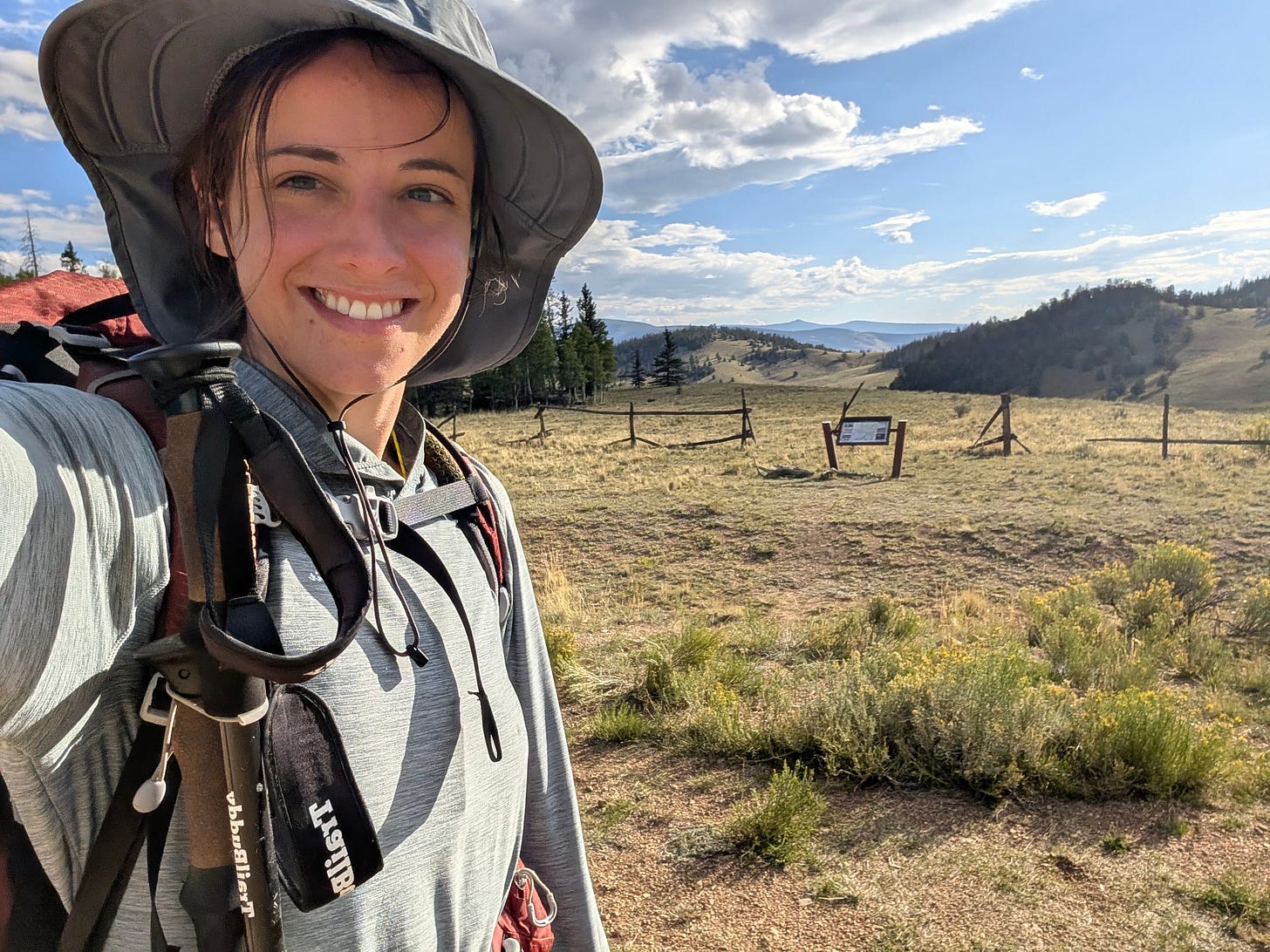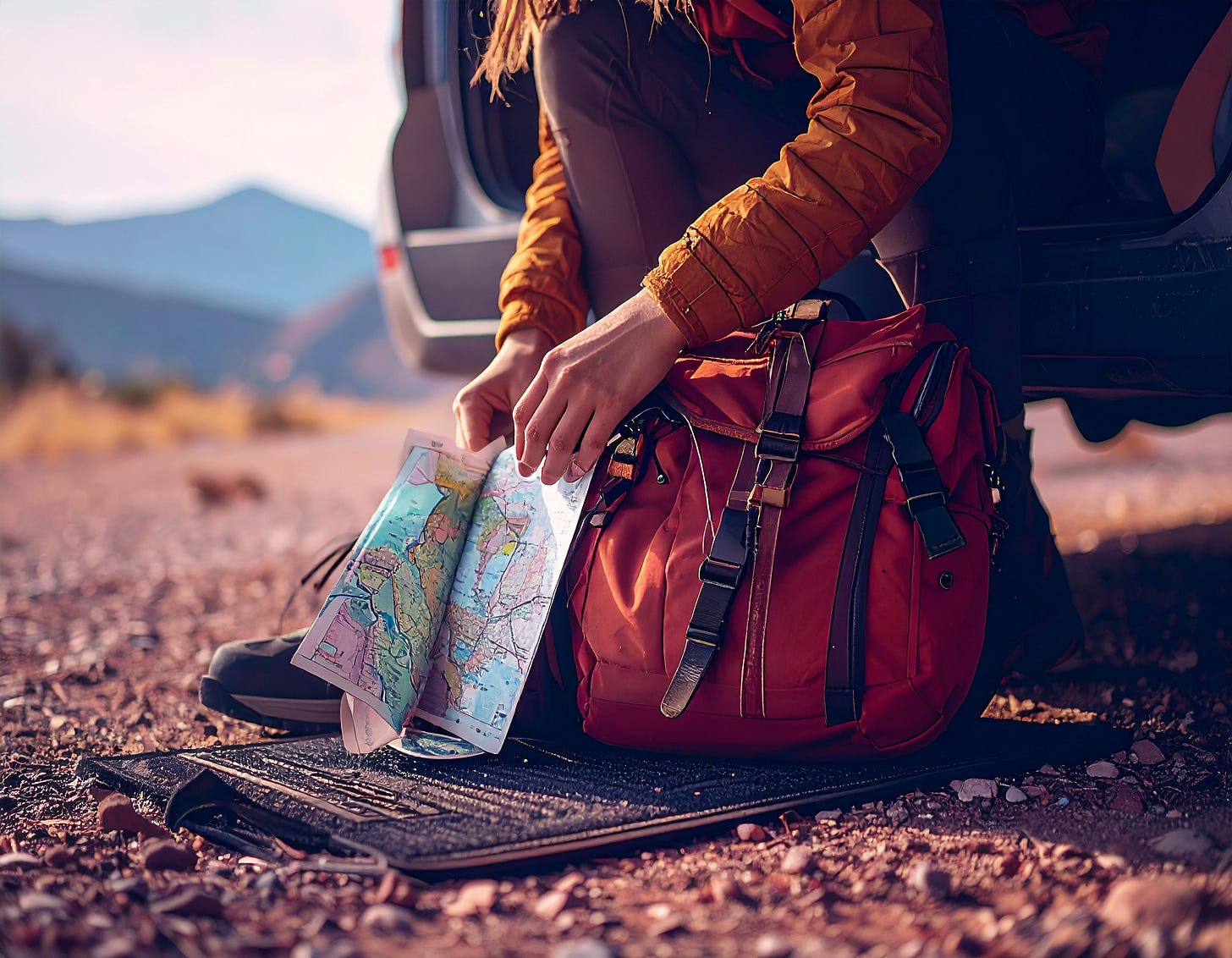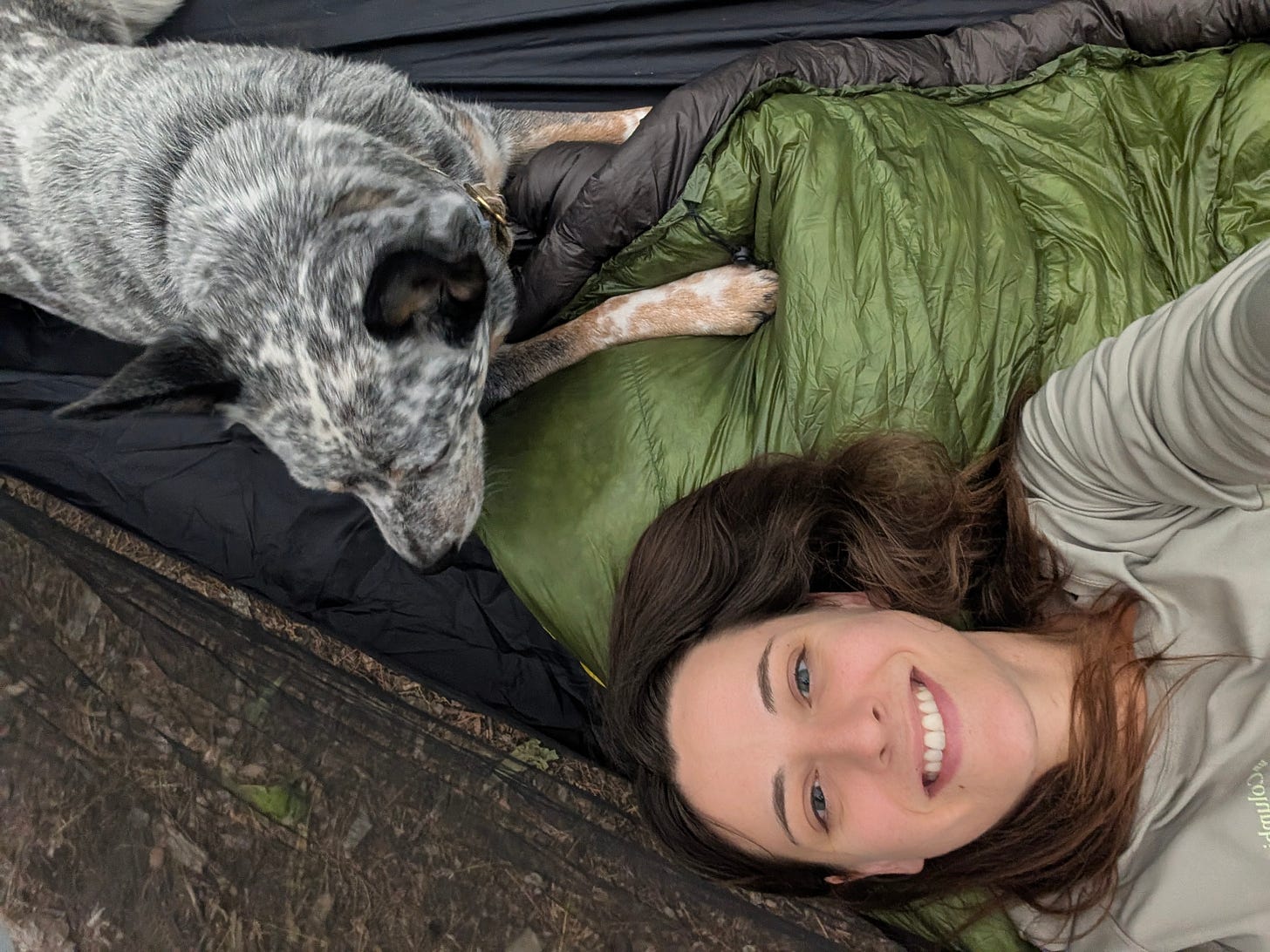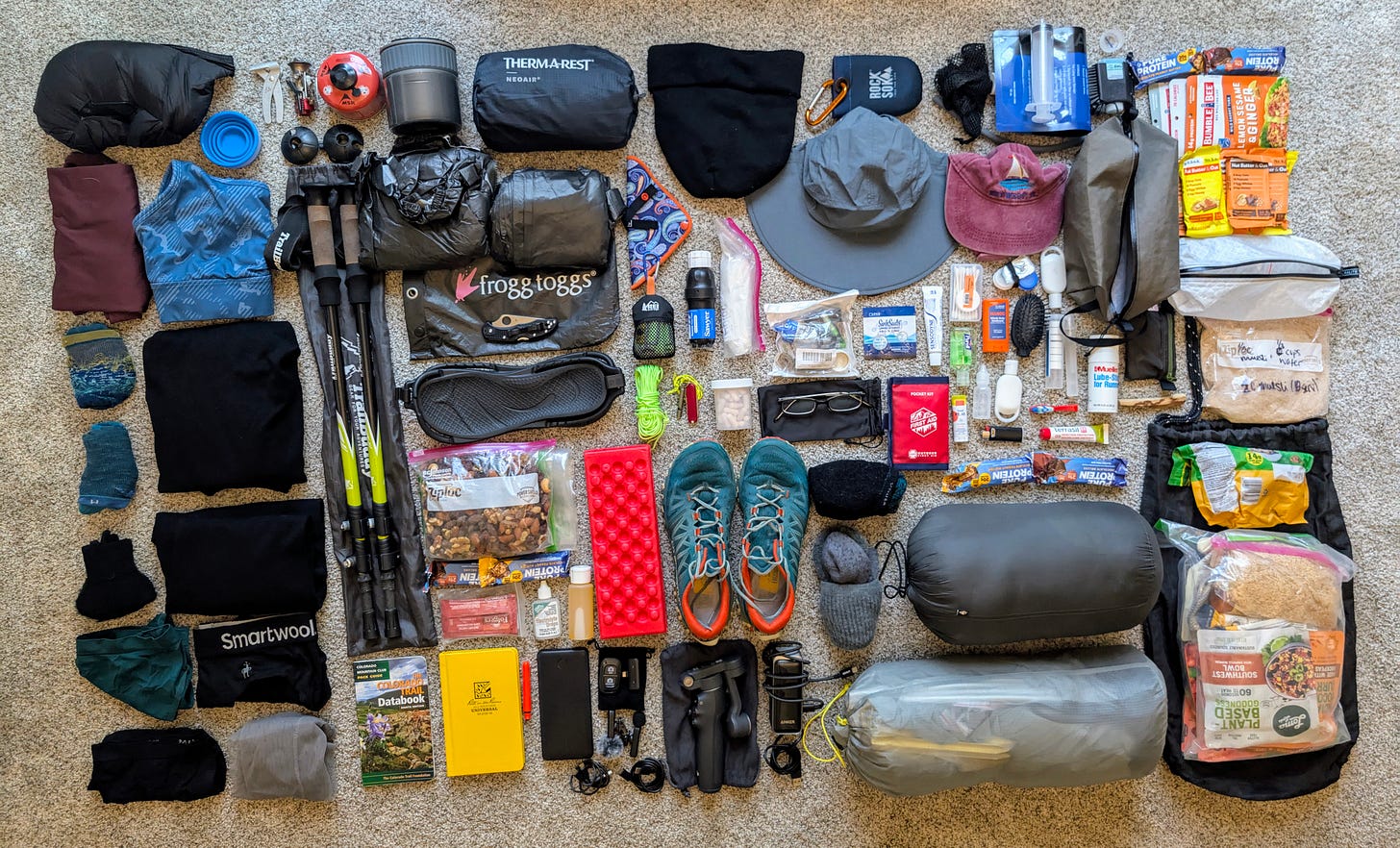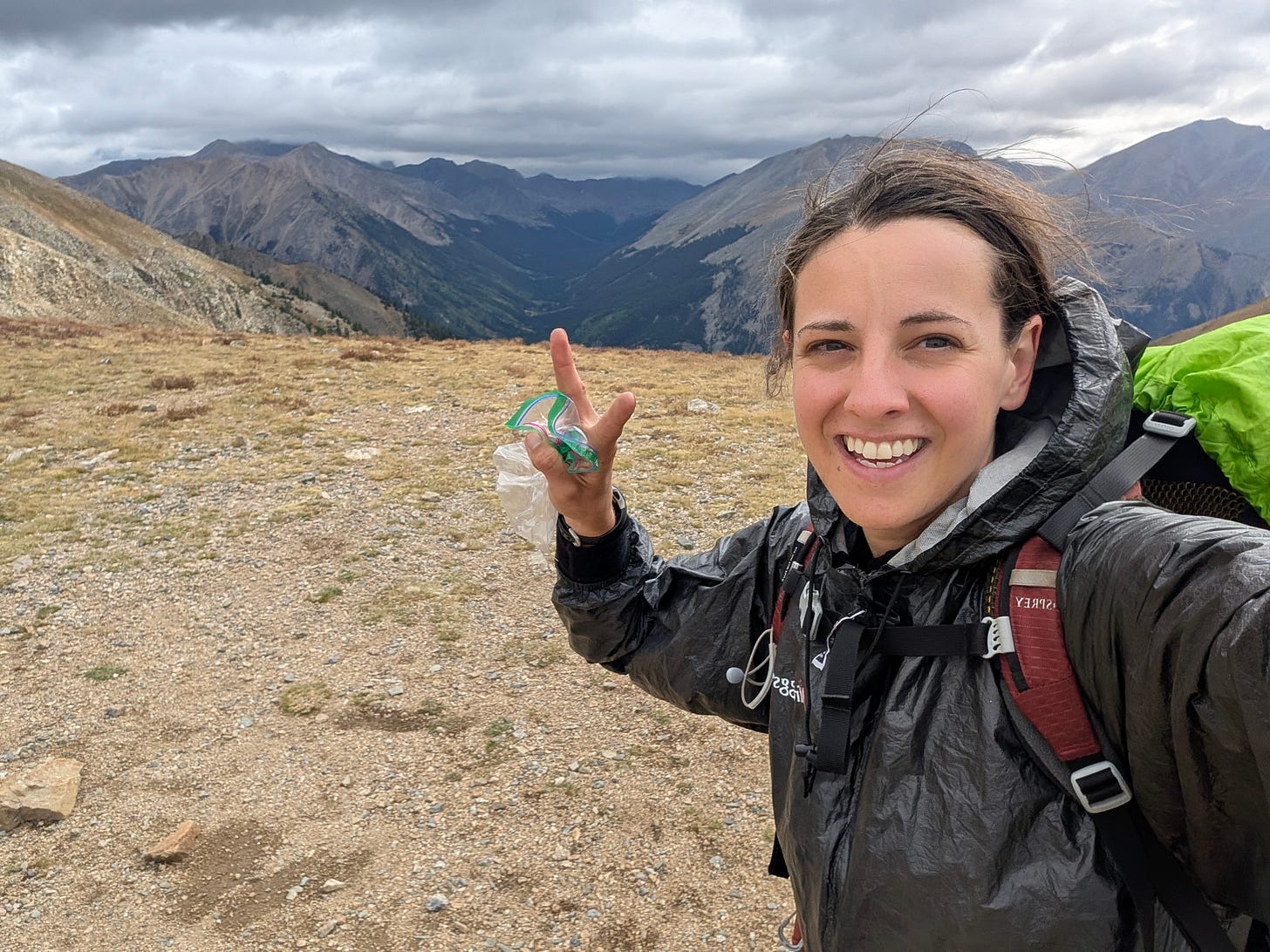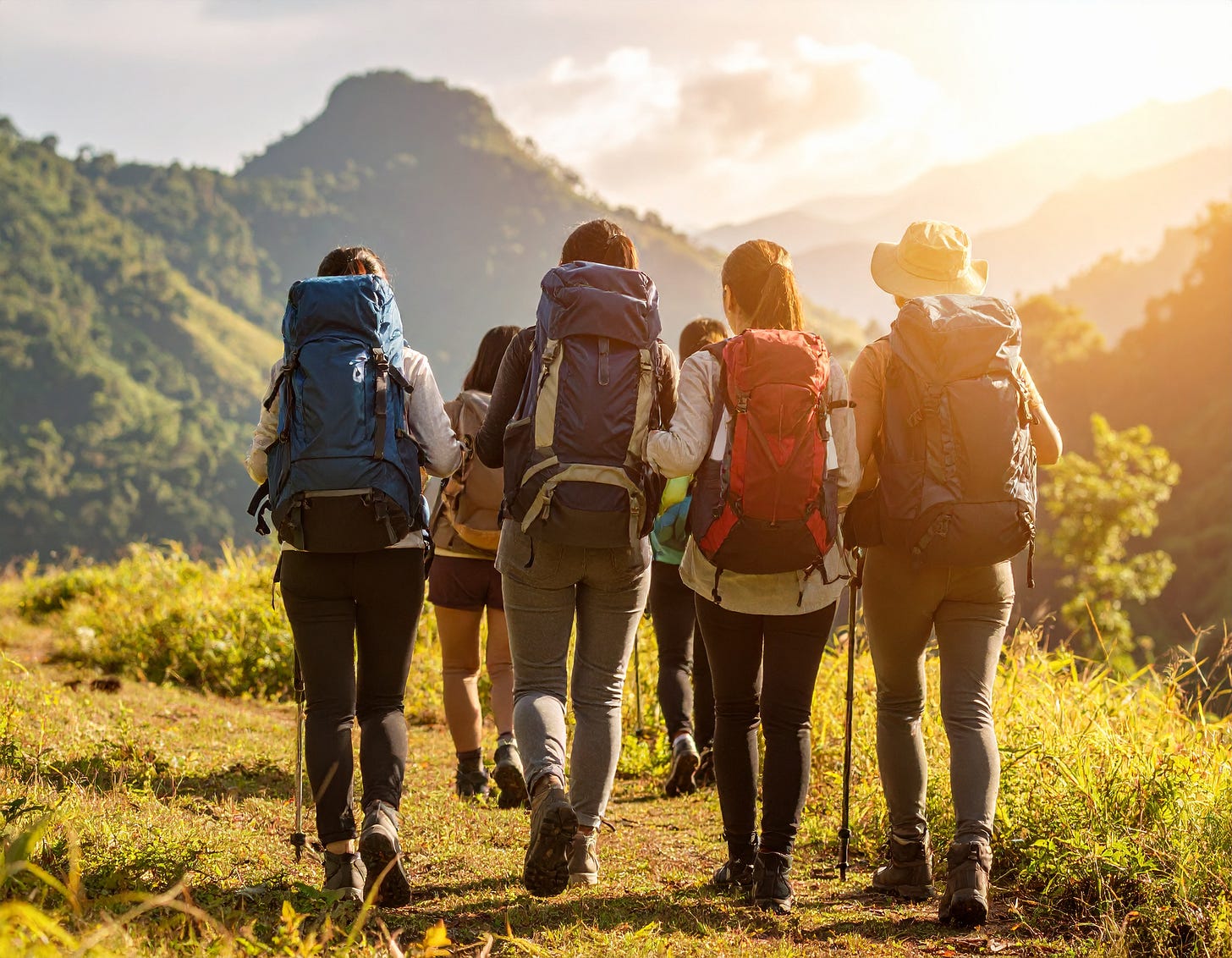Women Hiking Alone: Safety, Confidence, and Practical Tips for Solo Female Hiking
A practical guide for women hiking alone. Learn how to plan, stay safe on trailheads and in camp, choose smart routes, handle storms and wildlife, and hike with confidence.
Women Hiking Alone: Practical Safety Tips for Solo Female Hiking
If you spend five minutes in the hiking corner of the internet, the algorithm will try to feed you a steady diet of disaster. One tragic story paired with a comment section full of courtroom energy. Then the same question, repeated like it is wisdom:
Why would she go out there alone?
Women hiking alone is not reckless.
It is a matrix of deliberate planning, judgment, and the quiet skill of noticing small problems early (before they become big ones). It is also Type Two Fun in its purest form: challenging in the moment, but enormously rewarding once you realize you trusted yourself and everything turned out okay.
I thru-hiked the Colorado Trail solo last fall, and I’ve also backpacked major sections of the Appalachian Trail on my own. I have done the 20-mile long water carries where your brain starts bargaining with the next creek, and I have dealt with altitude symptoms that did not care about my confidence. I have even woken up to weird noises near my tent, so I understand the visceral fear that goes along with that experience, as well as the action plan that follows.
This guide will help you understand how to plan, navigate, and stay safe while hiking alone as a woman, without losing the joy that makes solo hiking worth doing.
Is It Safe To Hike Alone As a Woman?
The short answer: with the right precautions, absolutely. Women who hike alone can mitigate a majority of the risk involved when they plan for the most common risks: weather, terrain, navigation errors, dehydration, and human weirdness at predictable pinch points like trailheads.
The wilderness is not a crime documentary. In fact, many female thru-hikers say they feel safer deep in the wilderness than in their own hometowns.
Experienced thru-hiker “Wrong Way” echoes this sentiment:“I feel much more confident being alone on trails than I do on sidewalks. I think that most people in trail settings truly and absolutely want to see each other succeed.” The statistics back this feeling: violent incidents on long trails are exceedingly rare, and you’re far more likely to encounter danger from terrain or weather than from another person.
Here’s What Actually Increases Safety the Fastest:
Start earlier than you think you need to
Hike in daylight whenever possible
Set a turnaround time in advance (if applicable), then obey it
Download maps offline, even if you think you will have service
Always carry a map and compass as backup for your phone’s GPS
Before you set out, leave your route plan with someone you trust
Choose well-traveled routes first & conduct shakedown hikes to build confidence
The Mindset That Keeps Solo Women Safe
The safest solo hikers follow one rule: listen to your gut. If a situation or person gives you bad vibes, honor that feeling. Don’t worry about being polite – “I am an advocate for being rude, standoffish, and lying to people while backpacking if needed,” writes one female thru-hiker bluntly. You don’t owe anyone your trust.
Three Mindset Rules:
If your gut says leave, leave. No debate.
If you are unsure, slow down and reassess.
The bottom line: safety > niceties, every time.
With that said, don’t be afraid to make friends on trail – you can camp together or hike in loose groups when desired, and go solo when you crave solitude.
As hiker “Lady Scout” discovered on the PCT, even after her initial hiking partner left, “At a certain point on a thru-hike, the only people around you are other long-distance hikers. The community gives a sense of comfort.” On popular trails like the Appalachian Trail, you might actually have to seek solitude at times, since there are so many fellow hikers.
Pre-Hike Safety Checklist
Before you hike alone, lock in the basics: route, weather, time plan, check-in plan, navigation, and minimum survival layers. This reduces 80% of avoidable problems before you ever step on trail.
Route: saved offline, including bailout options
Weather: checked for your start time and your return window
Time: turnaround time set before you start
Check-ins: one person at home knows your plan and your return time
Navigation: offline map app plus a backup method
Water: enough for the conditions, plus a buffer
Layers: insulation and rain protection even on nice days
Light: headlamp always
Food: extra calories beyond the plan
If you are undertrained, you will make more bad decisions. Fitness is a safety factor.
Route and Timing: How to Reduce Risk Fast
The easiest way to reduce risk is to be picky about where and when you hike alone.
Popular trails are not a failure. They are a training ground.
When I was building confidence hiking solo, I chose routes with predictable terrain and steady traffic. I saved remote, exposed routes for days when my judgment felt sharp and the weather window was generous.
Best practices:
Start earlier than you think you need to, especially in mountains
Pick popular trails for your first solo hikes
Avoid late-night returns to empty parking lots
Plan a conservative turnaround time, then obey it
In summer mountain ranges, assume afternoon storms and schedule around them
Trailhead Safety: Where Awareness Counts Most
Uncomfortable encounters are usually distilled down to trailheads, not deep in the backcountry. Trailheads concentrate strangers, vehicles, and uncertainty. Your job is to look prepared, limit your exposure, and leave a clean footprint of information with someone you trust.
Trailhead protocol:
Arrive in daylight when possible
Keep your keys and phone accessible
Do not announce you are alone
Avoid lingering by your vehicle
If someone is making you uncomfortable, change plans without explaining
Simple security upgrades:
Share your route and ETA with your check-in person
Use location sharing when you have service
Park in visible areas, near other cars when possible
The trail community also includes Trail Angels and kind strangers who help hikers out. Many towns along major trails have locals who offer rides (shuttles or friendly hitchhikes), maintain water caches, or even host hikers for a shower and meal.
As Heather Anderson eloquently puts it, “People of varying walks of life, ages, and means come together in search of a shared goal… This community extends far beyond the bounds of the narrow thread of trail we walked together.” The friendships you form out there can indeed last a lifetime, connected by the indelible memories of mud, blisters, sunsets, and summit triumphs shared.
Accepting generosity from strangers can be a beautiful part of the solo hike experience – it reminds you that people can be wonderfully good. Of course, exercise normal caution (as discussed) and stick to verified trail angels or those with good reputations among hikers.
On-Trail Habits That Prevent Problems
Solo hiking safety is mostly micro-decisions: drink before you are thirsty, eat before you bonk, keep checking your position, and stay ahead of weather.
On-Trail Habits:
Navigation checks at every junction and at regular intervals
Snack and water cadence, not reactive panic eating
If you feel off, stop and troubleshoot early: blisters, hot spots, fatigue
Keep your head up near streams, cliff edges, scree, and slick rock
Do not wear headphones. If you’re going to anyway, wear one earbud max
Remember: most emergencies begin as ignored inconveniences.
Campsite Selection and Night Security
Good campsites are found, not made. Choose established sites on durable surfaces, keep distance from water sources, and prioritize visibility and exit options over perfect views. Night security is about calm routines: food storage, camp hygiene, and choosing the right neighbors.
Campsite Selection Checklist:
Choose established campsites and durable surfaces when available
Camp at least 200 feet from lakes and streams to protect riparian areas and reduce animal traffic
Avoid low points where cold air pools and water collects
Avoid exposed ridgelines when storms are likely
If vibes are off, move. Your camp is not a contract.
Night Routines That Reduce Risk:
Food storage: follow local guidelines (bear can, hang, or lockers)
Keep a clean camp: smellables packed, trash managed
Headlamp and shoes staged where you can reach them fast
Know your bailout direction before you sleep
Lightning & Severe Weather: What to Know
Lightning is one of the most likely life-threatening hazards in exposed terrain.
Use conservative timing, avoid ridgelines when storms build, and follow the 30/30 rule: if the time between lightning and thunder is 30 seconds or less, descend rapidly (if you are exposed) or seek shelter, then wait 30 minutes after the last thunder before resuming.
Lightning Safety Checklist:
Check forecasts and start early
Get off ridges and peaks as clouds build
Avoid isolated tall trees
If you must wait it out, spread out from others
Put metal items like trekking poles away from your body
Resume only after the storm has clearly passed
Wildlife and environmental hazards
Most wildlife danger is management, not combat. Give animals space, secure food, and learn region-specific hazards. Environmental hazards like heat, cold, snow, and smoke are often more dangerous than animals.
Wildlife Basics:
Bears: give space, do not run, speak calmly and slowly, back away without turning your back, and as a preventative measure, always secure food and smellables
Snakes: watch footing, especially in warm rock areas
Bugs and ticks: treat prevention as routine, not optional
Tick Prevention Essentials:
Use repellent and check your body after hiking
Stay on trail and avoid tall grass when possible
What to Carry: Safety Gear Non-Negotiables
Safety gear should solve real problems: navigation failures, weather shifts, injury management, and emergency communication. The best setup is small, lightweight, and actually used.
Core Safety Gear Kit:
Offline maps on your phone plus a backup navigation method
Headlamp
Minimal first aid for blisters, cuts, sprains
Emergency warmth layer and rain protection
Extra water capacity and a treatment method
Whistle
Battery or charging solution
Optional but high-impact for solo hikers:
Satellite communicator for remote routes
Personal safety tool you are trained and comfortable using
Small knife or multitool
If you need a lightweight baseline list for safety (and other) gear, check out my comprehensive gear list for trail-tested recommendations.
When Something Goes Wrong
When you hike alone, your best skill is early decision-making. Stop small issues from becoming rescue scenarios. If you are lost, injured, or weather escalates, slow down, stabilize, and choose the safest exit.
Decision Rules:
Lost: stop, confirm location, backtrack to last known point, do not wander
Injured: stabilize, reduce swelling, consider whether you can walk safely
Weather: if you are unsure, descend and wait or exit
Human weirdness: create distance immediately, change plans, do not explain
Hiking solo as a woman can be incredibly empowering: you’ll learn that you can thrive in the wild on your own terms, navigate literal and figurative mountains, and find peace in your own company. Yes, you’ll also learn to deal with gross blisters, scary thunderstorms, and the occasional awkward encounter – but those become footnotes in a much larger story of accomplishment.
Trail Community: Solo, Sure, But Not Alone
One beautiful paradox of solo thru-hiking is that although you start alone, you often finish with a trail family. The long-distance hiking community is famously welcoming.
“One of my favorite things about being a woman who hikes is belonging to an incredible community of dedicated, tough, and empowered women,” writes Ellie, a backpacking guide who completed the AT in 2023.
Even if you start your thru-hike solo, you’ll meet others at shelters, campsites, water sources, and trail towns. Swapping stories over dinner or leapfrogging each other for days, you may form deep bonds.
Beyond the trail, there’s a vast online and off-trail community of female hikers sharing wisdom and encouragement. Social media groups, forums like Women of the Appalachian Trail, and blogs/newsletters (sup!) are great places to ask questions and learn from others’ experiences. You’ll find women who have thru-hiked while pregnant, women who started in their 60s, women of marginalized communities building inclusive hiking groups – a rich diversity of voices all cheering you on.
Have a favorite trail story, solo hiking tip, or gear recommendation? Drop it in the comments—your insight might inspire someone’s first adventure!
What to Do Next
As you prepare for your first solo thru-hike, take heart that thousands of women have done this before you, each with their own fears and doubts, and they are rooting for you. In the words of one veteran, “We must destigmatize this nearly universal experience” of women adventuring confidently outdoors. The more we share our stories and tips, the more we lift each other up. So here is your reminder: you are brave, you are strong, and you are capable – more than you even know. The trail will prove it to you.
As one solo hiker wrote after finishing her trek, “It proved to me that I could do anything. Now, whenever life gets hard, I remind myself: I walked from Georgia to Maine – I can handle this.”
Pack your bag, prepare well, then step onto the trail with confidence. There is a whole community of solo female badasses in your corner, some ahead of you leaving footprints to follow, and others behind you, inspired by your example. As the miles unfold, you may find that being a “solo” female hiker is paradoxically the most connected and supported you’ve ever felt.
What’s next? 👉 Check Out Part 2: Health, Gear, and Trail Resilience for Solo Women
Frequently Asked Questions
What is the best first solo hike for a woman?
Pick a popular, well-marked trail you can finish in daylight, with clear cell service for most of the route. Save offline maps anyway. Build confidence with repetition, not heroics.
Should women carry pepper spray while hiking alone?
Carry what you understand and can access quickly. Training and familiarity matter more than the item itself. Your first safety tool is awareness and early exits.
How do I deal with fear before hiking alone?
Fear drops when your plan gets specific. Choose a short trail, start early, set a turnaround time, and commit to leaving if anything feels off.
What should I bring for protection while solo hiking?
The answer is simple: carry the protection that makes you feel at ease. For some, that’s a small knife and a whistle; for others, a canister of pepper spray or bear spray. Many experts don’t recommend firearms for backcountry self-defense unless you’re highly trained, as a gun can create new risks.


